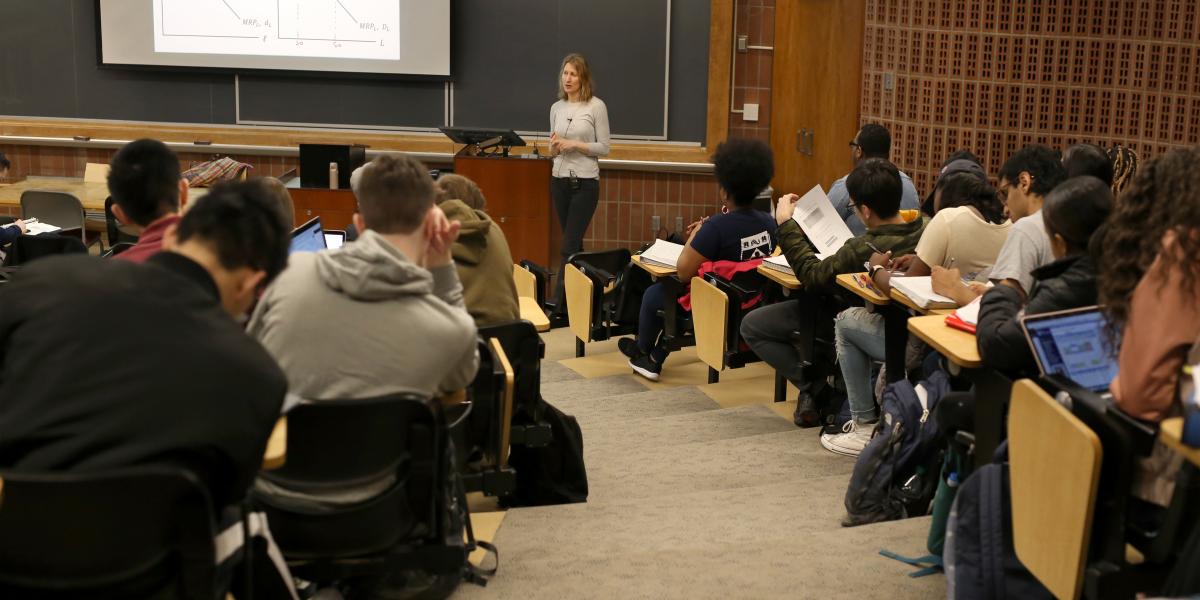
Overview
Economic policy questions stand at the center of public policy debates in the U.S. and countries all around the world. The goal of this minor is to provide students who are not majoring in economics with the analytical tools that are necessary to participate in and shape public policy debates.
The foundation for the minor is provided by the principles courses ECON 0100 (formerly 001): Microeconomics and ECON 0200 (formerly 002): Macroeconomics. After having completed the principles courses, the student can choose a minimum of four elective courses, which apply the basic tools of economic analysis to specific policy questions. For instance, Development Economics covers policies that promote growth, alleviate poverty, and improve health and educational attainment in underdeveloped countries. In Labor Economics students learn how to analyze the effect of minimum wages and welfare benefits on labor supply and unemployment, how to measure the effect of tuition subsidies, and job training programs. Other electives examine the effects of trade policies such as tariffs or export subsidies or currency unions (International Economics), health care policies (Economics and Financing of Health Care Delivery), or policies that regulate specific markets such as public utilities (Industrial Organization).
The Economic Policy Minor can be completed by taking courses that do not have calculus prerequisites. Students interested in declaring the minor should fill out the appropriate form. Students must have grades in at least ECON 0100 and 0200 with a minimum 2.0 in all classes that count for the minor to declare.
Requirements
The Economic Policy Minor consists of six courses, none of which may be taken pass/fail. The six courses include two required courses and four electives.
(Both courses are required)
-
ECON 0100 (formerly 001): Introduction to Microeconomics
-
ECON 0200 (formerly 002): Introduction to Macroeconomics
(Choose 4 from the list)
- ECON 0120 (formerly 013): Strategic Reasoning. Prerequisites: ECON 0100
- ECON 0420 (formerly 032): Political Economy. Prerequisites: ECON 0100
- ECON 0430 (formerly 033): Labor Economics. Prerequisites: ECON 0100
- ECON 0440 (formerly 036): Law and Economics. Prerequisites: ECON 0100
- ECON 0445: Introduction to the Digital Economy. Prerequisites: ECON 0100
- ECON 0450 (formerly 035): Industrial Organization. Prerequisites: ECON 0100
- ECON 0460 (formerly 045): Economics and Theories of Fairness. Prerequisites: ECON 0100, ECON 0200
- ECON 0465: Economics and Philosophy
- ECON 0500 (formerly 050): International Economics. Prerequisites: ECON 0100, ECON 0200 (or ECON 0110)
- ECON 0510 (formerly 024): Developmental Economics. Prerequisites: ECON 0100
- ECON 0615 (formerly 027): The International Monetary System from Sterling to Cryptocurrencies (1720-2020)
- ECON 0620 (formerly 028): Financial Meltdown, Past and Present. This course is crosslisted with HIST 1731 (formerly 131).
- ECON 0625 (formerly 029): Introduction to Business, Economic, and Financial History. This course is crosslisted with HIST 3710 (formerly 225).
- ECON 0630 (formerly 039): Economics and Financing of Health Care Delivery. Prerequisites: ECON 0100
- ECON 2300 (formerly 103): Statistics for Economists. Prerequisites: ECON 0100, ECON 0200, MATH 1400 (formerly 104) or 1070, MATH 1410 (formerly 114) or 1510 (formerly 115) or 1080
Please note that not all of these courses are offered in each academic year. You can find information on the course offerings under Course Information
-
A 0-level course can be substituted with a 4000-level (formerly 200-level) course in the same subject area if the student meets the prerequisites for the 4000–level course. For most of these 4000-level courses the prerequisites are ECON 2100, Math 1400 or 1070, and Math 1410 (or Math 1510) or 1080.
-
Students are required to take four of the six economics courses in residence at the University of Pennsylvania. All courses taken in residence must be taken within the Economics Department. No substitutions for courses from other departments will be accepted.
-
Students must have a GPA of 2.0 in the Economics Policy Minor in order to graduate with a minor in Economic Policy.
-
Only three of the six courses are allowed to double count toward the fulfillment of other minors or majors offered by the College.
-
Students who have declared an Economics Major, a Mathematical Economics Major, or an Economics Minor cannot receive an Economic Policy Minor.
-
Wharton students who wish to pursue an Economic Policy Minor may substitute Econ 0100 and Econ 0200 with BEPP 1000 and BEPP 2500. No additional substitutions are permitted.
-
Students who have received ECON 0100 credit and an ECON 0200 waiver for a single semester introductory micro/macro course need to take an additional 0xx (or higher) level ECON course to complete the minor.
-
Starting with students entering Penn in the Fall of 2017, we will no longer convert advanced placement waivers (AP, IB, and A-Level) for ECON 0100 or ECON 0200 into course credits upon completion of the ECON minor, the EPOL minor, the ECON major, or the MATH-ECON major. However, the waiver can be used to satisfy prerequisites for higher-level economics courses.
A student with an advanced placement waiver (AP, IB, and A-Level) in ECON 0100 (or ECON 0200) has two options:
(i) Take ECON 0100 (or ECON 0200) at Penn and count it toward the minor.
(ii) Take an additional ECON course to replace ECON 0100 (or ECON 0200).
Students who have waivers for both ECON 0100 and ECON 0200 need to take two additional ECON courses.